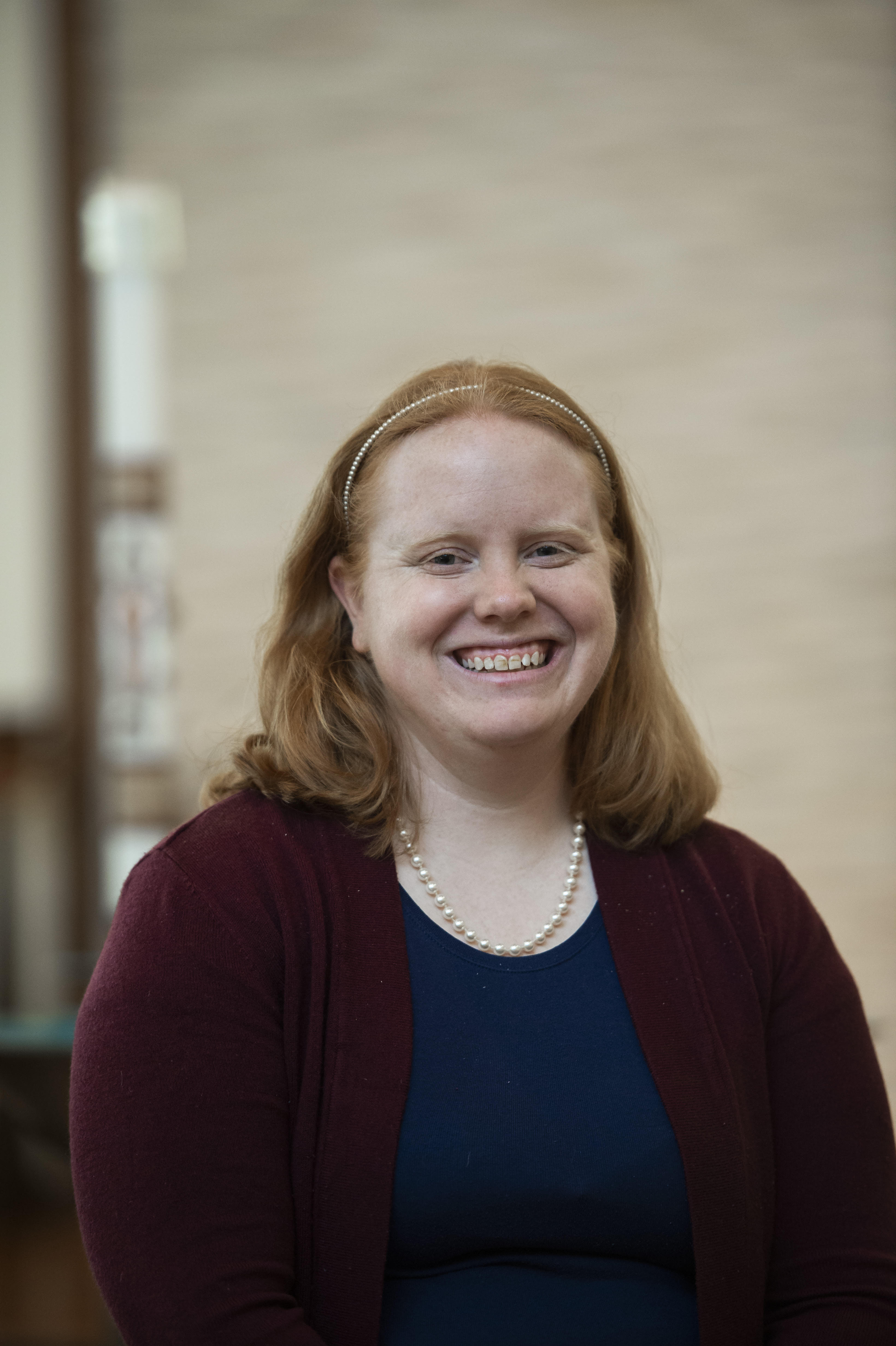Fifteenth Sunday after Pentecost
Adult and Small Child
Allison Liles

The Rev. Allison Sandlin Liles is a wife, mother, peacemaker, and priest learning to navigate life in the suburban wilds of Dallas, Texas. After working as Episcopal Peace Fellowship’s Executive Director for six years, Allison has re-entered parish ministry in the Diocese of Fort Worth. She currently serves as the Priest-in-Charge of St Stephen’s Episcopal Church in Hurst, Texas and the editor of Grow Christians, a ministry of Forward Movement.
Read: 1 Timothy 2:1-7
Reflect: Today’s epistle comes from 1 Timothy, a book all about how churches should organize and structure themselves. This reading begins with a best practice for prayer lists. First, “supplications, prayers, intercessions, and thanksgivings be made for everyone.” (1 Timothy 2:1, NRSV) Second, be sure to lift up “kings and all who are in high positions.” (1 Timothy 2:2, NRSV) We learn that we should pray in particular that people in positions of power will restrain from evil actions, choosing instead to encourage peace and security. The author wants to be sure we are praying for the government rather than to the government. Though they serve as our leaders, these are human beings, not divine beings. This is why the bulk of our lesson today reads as a theology textbook, focusing salvation and atonement theory.
Respond: Who are authority figures in your child’s life? Spend time naming their teachers at school and church, clergy, grandparents, godparents, and perhaps even civic leaders. Create a simple prayer calendar for the week and designate a specific person or group to pray for each day. You can write the names, while the child decorates each box of the calendar. Tape it on a bathroom mirror or the refrigerator where you are sure to see it each day.
-Allison Liles
Adult and Elementary Victoria Hoppes is the Director of Youth and Children's Ministries at Resurrection Lutheran Church in Indianapolis, Indiana. She has ministry experience with youth, family, and camping programs at both the parish and diocesan levels. She holds degrees from Texas Lutheran University and Luther Seminary. She also holds a certificate in Youth and Family Ministry from Forma’s certificate program. You can follow Victoria on social media (@vlhoppes).Victoria Hoppes

Read: 1 Timothy 2:1-7
Reflect: For what or whom do you pray? Maybe you pray for people who are sick or hurting. Maybe you pray for your family and friends. Maybe you pray for people in your community. You may pray for all of these people, and more. Our hurting world is in need of prayer!
In this passage from 1 Timothy, we are told to pray for everyone--not just people who we know well. We are told to do this because God’s love is for everyone! Even if a person is unfamiliar, or we don’t like or agree with them, they can still be on our hearts, and we should ask God to help and guide them. In today’s world, it is sometimes hard to pray for people who we consider enemies, or with whom we don’t agree. However, when do pray for those people, we are reminded that God’s love and grace is for everyone, no matter who they are.
Respond: Grab some craft sticks (or even slips of paper will do.) On each stick (or slip of paper), write the names of people in our world for whom you should pray. Be intentional about naming people who you don’t normally pray for, or people with whom you may not agree. Place the sticks (or paper) in a jar or cup. Each day, draw one of the sticks and say a prayer for the person you named.
-Victoria Hoppes
Who will you hold in your heart this week?
Adult and Youth Wallace Benton serves as the Assistant to the Rector for Youth Ministries at St. David's Episcopal Church in Roswell, GA. He's been fortunate to have grown up in the Episcopal Church and became interested in youth ministry after volunteering with his former youth program after college. Wallace has worked diocesan retreats and activities such as New Beginnings and Happening.
Currently, he is the lay director for New Beginnings in the Diocese of Atlanta. He is also a member of the Episcopal Youth Ministry in ATL podcast (which you should check out immediately!)
Wallace Benton

Read: 1 Timothy 2:1-7
Reflect: In Paul’s letter to his mentee, Timothy, he is focused on two discussion points. The first is about prayer for everyone, not just people who we like or admire. Paul encourages us to pray for everyone, specifically our leaders and those in high positions. Paul was writing this during a time period when Christians were persecuted by the Roman Empire, and Paul asks for prayers for those leaders which, hopefully, would lead to peaceable lives for fellow Christians. Then, the passage focuses on a theological reflection about God and Jesus, similar to what we say in the Nicene Creed. Paul finishes by saying he was appointed as a herald and a teacher of the Gentiles (non-Jewish) in the Christian faith.
In a modern context, Paul’s urging for prayers for everyone is not only beneficial for those people, but those prayers are beneficial for us. They reconnect us with God, help to soothe us in times of stress, and provide opportunities to learn more about God. Comparing the Nicene Creed to Paul’s theological reflection reminds us that there is only one God and Jesus was a human who served as a sacrifice for our sins.
Respond: Heard of an ACTS prayer (Adoration, Confession, Thanksgiving, Supplication)? Adorations are forms of praise, while Confessions are admitting to the ways we have pulled away from God and actions that have hurt others. Thanksgivings are the things we are thankful for or blessed with. Lastly, Supplications are the things we ask for God’s influence in our lives. Write a prayer following this model and consider praying for everyone, including those who you may not think need your prayers.
-Wallace Benton
Adult and Adults Regina Heater (she/her/they is a self-avowed and practicing ecumenist, story-collector and story-sharer. A church administrator for a United Methodist Church in Northern NJ, she's exploring how administration, communication, faith formation and pastoral care all intersect in the church office. She often creates and posts #PrayersForDaysThatEndInY on the social internet. Connect with her at www.reginaheater.com.Regina Heater

Read: Jeremiah 8:18-9:1
Reflect: As I write this, I’m ignoring the social internet. Breaking news from earlier this morning and the accompanying, endless analysis is weighing on me. This news will have far-ranging consequences for the whole world; some might consider it calamitous. In another headline, the continued oppression of an ethnic group barely gets noticed in the swirl. I am near tears.
I can identify with this voice in the text. It could be Jeremiah himself, it could be the voice of the Lord - scholars disagree with compelling arguments for both - but whomever it is, I get it. We’re in an age when we don’t grieve well. Terrible things happen and we’re told how it could have been worse; our hearts break in tragedy and we swiftly move to arguing over the appropriateness of how we share our pain. We see suffering and we’re told how those people deserved it because they didn’t follow a rule imagined by government or religion. We rarely lament. We rarely let our tears flow. We rarely simply declare our pain and brokenness to simply be what it is: our truth, our emotions, not something to be dismissed, or solved.
It’s OK to grieve. It’s OK to cry. It’s OK to confess our brokenheartedness and our pain to one another, and it’s OK to say “I feel that way, too.” It’s OK to say, “My joy is gone, grief is upon me, my heart is sick.” And for a time, leave it at exactly that. Relief will come, in time. Solutions will come, in time.
For now, we hold space to acknowledge to one another that it hurts to see the world the way it is, to miss our loved ones, to endure the pain of our illnesses and limitations.
Respond: This week, be on the lookout for those around you who are suffering, whether directly because of something in their lives or because of the way of the world. See if you can hold space for them without offering instruction, platitudes or solutions.
-Regina Heater
Download a printable copy of this week's devotions HERE.
Tags: Lectionary Based Readings & Reflections / Latest Posts

